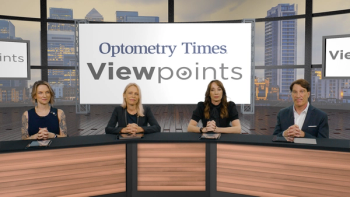
AAOpt 2022: Helping patients understand, manage their headaches
Anthony DeWilde, OD, FAAO, shares highlights from his AAOpt presentation, "What a pain! An optometrist's guide to headaches."
Anthony DeWilde, OD, FAAO, adjunct instructor for the University of Missouri College of Optometry, and director of the Tele-Eye Imaging Program for VA [Veterans Affairs] Kansas City Health Care, speaks with Optometry Times®' Kassi Jackson on highlights from his discussion titled, "What a pain! An optometrist's guide to headaches," which he presented during the 2022 American Academy of Optometry (AAOpt) Meeting in San Diego.
Editor's note: This transcript has been edited for clarity.
Jackson:
Hi everyone. I'm Kassi Jackson with Optometry Times and I'm joined today by Dr. Anthony DeWilde, adjunct instructor for the University of Missouri College of Optometry and director of the Tele-Eye Imaging Program for VA [Veteran Affairs] Kansas City Health Care. He's here to share highlights from his discussion titled, "What a pain! An optometrist's guide to headaches," which he is presenting during the 2022 American Academy of Optometry Meeting, held this year in San Diego. Thank you for being here, Dr. DeWilde. Tell us about your talk.
DeWilde:
Thank you so much for having me. My talk, "What a pain!" is, I think, a very interesting talk for optometrist. We tend to think of eye issues, right. And headaches seem to be kind of a whole other realm that's mostly dealt with primary care or maybe neurology. One of the key takeaways from this is that a lot of patients actually come to the eye doctor because of headaches. And I think they're worried about this from a couple different standpoints.
One is, could my eyes be contributing to my headaches? Is there some sort of ocular cause that could be making me get headaches or making my headaches worse? And then from the other standpoint, is they're worried that these headaches could be a sign of something wrong with the eyes. So am I missing something that if I didn't catch it now, would I worry that down the road, I wish I would have caught it earlier? This could be an early harbinger of something wrong with my eyes.
So some of the key takeaways are, as optometrists, we are a very valuable member in the medical society where we want to try to help these patients out, get them in the right hands. And by just simply understanding a lot of the certain headache syndromes, especially if trigeminal pain cluster headaches falling under that, things like migraines, and then other ocular causes for headaches, we can kind of get them in the right direction of who they need to see. So it's case histories just incredibly important for this. And we kind of walk through how to go through each of those.
Jackson:
And what does that mean for patient care?
DeWilde:
So in a similar vein, if the patient's coming to us wanting to know, is this affecting my eyes? Or could this be something that if I don't address now could get worse? We want to be able to have an intelligent conversation with the patient. And know, okay, this is a serious headache, or this is maybe not quite as serious. So let me give you an example of the, you know, if a patient comes in with a headache, and it sounds like something like giant cell arteritis, it's a more urgent thing we want to address quicker, versus something like a migraine, which you know, is a very painful headache and we want to make sure we get them in the hands of the right people, but isn't quite as urgent or potentially life threatening. So by understanding the difference between those, we can educate the patient and figure out a treatment plan that works for them.
Jackson:
Is there anything you'd like to add that we didn't touch on?
DeWilde:
There's a lot of really exciting things when it comes to headaches now, and you don't really think of headaches as being exciting, necessarily. But there's some new treatment modalities for this.
Specifically, there's a medicine that blocks something called calcitonin gene receptor peptide, or CGRP. And there's a bunch of new versions of this. They tend to be more injectable medications, a subcutaneous injection, but there are pill versions of this coming out now. And what's so exciting about this is not only do they make the headaches not as bad, but patients can have fewer headaches.
So I've had a lot of patients at the VA [Veteran Affairs] who have been suffering with migraines or other types of headaches for years, and the treatment they're on works okay. But they don't know about this new modality. We get them in the hands of someone who could prescribe it. And they turn out to have much better outcomes from this than any of the therapies we've had in the past. So this is a very exciting time for the treatment of headaches. And I think moving forward, we're going to see even more innovation in that space.
Jackson:
That is very exciting. And I'm sure everybody enjoyed the talk. So Dr. DeWilde, thank you for being here today and for your time.
DeWilde:
Thank you so much, Kassi; [I] appreciate it.
Newsletter
Want more insights like this? Subscribe to Optometry Times and get clinical pearls and practice tips delivered straight to your inbox.










































